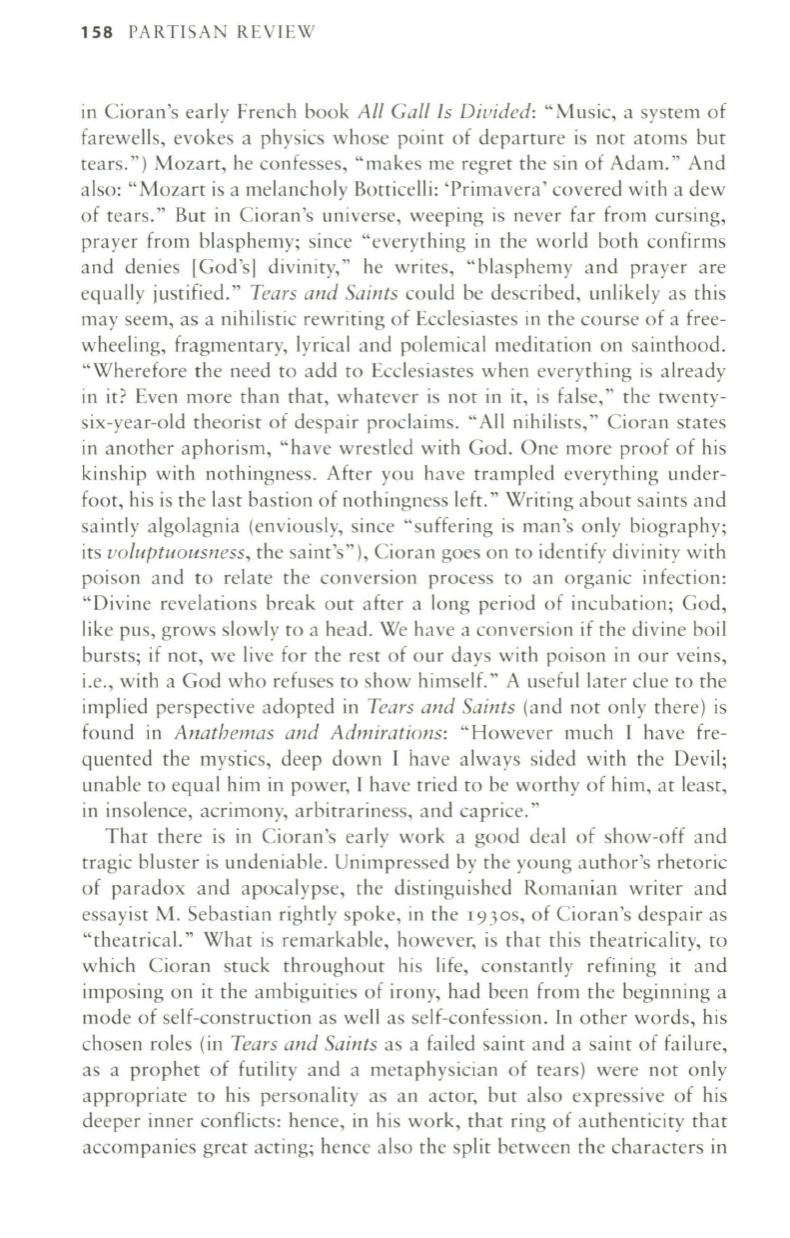
158
PARTISAN REVIEW
in Cioran's early French book
All Gall Is Divided:
"Music, a system of
farewells, evokes a physics whose point of departure is not atoms but
tears.") Mozart, he confesses, "makes me regret the sin of Adam." And
also: "Mozart is a melancholy Botticelli: 'Primavera' covered with a dew
of tears." But in Cioran's universe, weeping is never far from cursing,
prayer from blasphemy; since "everything in the world both confirms
and denies lGod'sl divinity," he writes, "blasphemy and prayer are
equally justified."
Tears and Saints
could be described, unlikely as this
may seem, as a nihilistic rewriting of Ecclesiastes in the course of a free–
wheeling, fragmentary, lyrical and polemical meditation on sainthood.
"Wherefore the need to add to Ecclesiastes when everything is already
in it? Even more than that, whatever is not in it, is false," the twenty–
six-year-old theorist of despair proclaims. "All nihilists," Cioran states
in another aphorism, "have wrestled with God. One more proof of his
kinship with nothingness. After you have trampled everything under–
foot, his is the last bastion of nothingness left." Writing about saints and
saintly algolagnia (enviously, since "suffering is man's only biography;
its
voluptuousness,
the saint's"), Cioran goes on to identify divinity with
poison and to relate the conversion process to an organic infection:
"Divine revelations break out after a long period of incubation; God,
like pus, grows slowly to a head. We have a conversion if the divine boil
bursts; if not, we live for the rest of our days with poison in our veins,
i.e., with a God who refuses to show himself." A useful later clue to the
implied perspective adopted in
Tears and Saints
(and not only there) is
found in
Anathemas and Admirations:
"However much I have fre–
quented the mystics, deep down I have always sided with the Devil;
unable to equal him in power, I have tried to be worthy of him, at least,
in insolence, acrimony, arbitrariness, and caprice."
That there is in Cioran's early work a good deal of show-off and
tragic bluster is undeniable. Unimpressed by the young author's rhetoric
of paradox and apocalypse, the distinguished Romanian writer and
essayist M. Sebastian rightly spoke, in the
1930S,
of Cioran's despair as
"theatrical." What is remarkable, however, is that this theatricality, to
which Cioran stuck throughout his life, constantly refining it and
imposing on it the ambiguities of irony, had been from the beginning a
mode of self-construction as well as self-confession.
In
other words, his
chosen roles (in
Tears and Saints
as a failed saint and a saint of failure,
as a prophet of futility and a metaphysician of tears) were not only
appropriate to his personality as an actor, but also expressive of his
deeper inner conflicts: hence, in his work, that ring of authenticity that
accompanies great acting; hence also the split between the characters in


